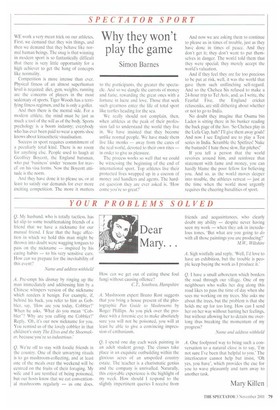Why they won't play the game
Simon Barnes
WE work a very mean trick on our athletes. First, we demand that they win things, and then we demand that they behave like normal human beings. The snag is that winning in modern sport is so fantastically difficult that there is very little opportunity for a high achiever to get the hang of concepts like normality.
Competition is more intense than ever. Physical fitness of an almost superhuman level is required: diet, gym, weights, running are the concerns of players in the most sedentary of sports. Tiger Woods has a terrifying fitness regimen, and he is only a golfer.
And then there is the mental side. For a modern athlete, the mind must be just as much a tool of the will as of the body. Sports psychology is a boom industry; everybody who has ever been paid to wear a sports shoe knows about kinaesthetic visualisation.
Success in sport requires commitment of a peculiarly total kind. There is no room for anything else. People used to laugh at Geoffrey Boycott, the England batsman, who put 'business' under 'reasons for travel' on his visa forms. Now the Boycott attitude is the norm.
And they have done it to please us, or at least to satisfy our demands for ever more exciting competition. The more it matters to the participants, the greater the spectacle. And so we dangle the carrots of money and fame, rewarding the great ones with a fortune in lucre and love. Those that seek such greatness enter the life of total sport like turtles heading for the sea.
We really should not complain, then, when athletes at the peak of their profession fail to understand the world they live in. We have insisted that they become unlike normal people. We have made them live like monks — away from the cares of the real world, devoted to their own rites — in order to give us pleasure.
The process works so well that we could be witnessing the beginning of the end of international sport. Top athletes live their protected lives wrapped up in a cocoon of money and handlers and agents. The hardest question they are ever asked is, 'How come you're so great?' And now we are asking them to continue to please us in times of trouble, just as they have done in times of peace. And they don't get it; they don't want to put themselves in danger. The world told them that they were special; they merely accept the world's valuation.
And if they feel they are far too precious to be put at risk, well, it was the world that gave them such unflinching self-regard. And so the Chelsea Six refused to make a 24-hour trip to Tel Aviv, and, as I write, the Fearful Five, the England cricket refuseniks, are still dithering about whether or not to go to India.
No doubt they imagine that Osama bin Laden is sitting there in his bunker reading the back page of the Sun. 'So Chelsea play in the Uefa Cup, huh? I'll give them away goals! And now I see England are to play a Test series in India. Scramble the Spitfires! Nuke the bastards! I hate those slow, flat pitches!'
If you tell a person that the world revolves around him, and reinforce that statement with fame and money, you can hardly blame the poor fellow for believing you. And so, as the world moves deeper into trouble, the athletes retreat — just at the time when the world most urgently requires the cheering banalities of sport.


















































































 Previous page
Previous page